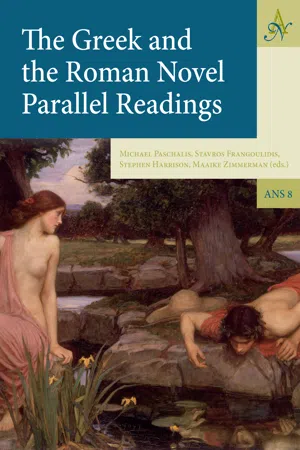
The Greek and the Roman Novel
Parallel Readings
- 307 pages
- English
- PDF
- Available on iOS & Android
The Greek and the Roman Novel
Parallel Readings
About this book
Ancient Narrative Supplementum 8 is the first volume to be dedicated entirely to parallel readings of the Greek and the Roman novel. As a rule, publications taking a comprehensive look at the ancient novel treat the Greek and the Roman novels independently of each other, or at most discuss standard thematic categories. It is intriguing that a sharp distinction between the Greek and the Latin novels should have ever existed and that it should be tacitly maintained at the present time. Of the three surviving Latin novels, Apuleius' Metamorphoses has a Greek model, Petronius' Satyrica bears distinct traces of Greekness, and the Historia Apollonii strongly resembles the Greek ideal novel, especially Xenophon's Ephesiaka. The discovery of new papyrus fragments of Greek fiction (Lollianos' Phoinikika, the Iolaos and the Tinouphis fragments) has shown that low-life, comic, and sensational features are not the exclusive province of the Latin novel. Recent chronological revisions have squeezed the dates of the earliest Greek novels into the period between 41 and 75 A. D., thus envisaging the birth of the Greek novel and that of the Roman Satyrica as contemporary or near-contemporary events. The need to re-examine the relations between the two main traditions of the ancient novel in the context of a unified Greco-Roman tradition emerges today as more urgent than ever. The portrayal on the cover page of this volume of Echo and Narcissus, of self-reflection and reduplication of sound, symbolizes a pictorial challenge to look at the dialectics of the Greek and the Latin novels and appreciate their intimate relationship.The parallel readings of the present volume explore various issues in Greco-Roman fiction: political accommodation in coming-of-age novels, the language and practice of magic, narratives of failure, textual considerations and narrative meaning, hidden authors, proposals and criteria for dating, the access to knowledge, plot structures, religion and narrative, the fortunes of Athenian Hellenism, vision and narrative, attitudes towards Roman imperial rule, and the motif of the stolen cup.
Frequently asked questions
- Essential is ideal for learners and professionals who enjoy exploring a wide range of subjects. Access the Essential Library with 800,000+ trusted titles and best-sellers across business, personal growth, and the humanities. Includes unlimited reading time and Standard Read Aloud voice.
- Complete: Perfect for advanced learners and researchers needing full, unrestricted access. Unlock 1.4M+ books across hundreds of subjects, including academic and specialized titles. The Complete Plan also includes advanced features like Premium Read Aloud and Research Assistant.
Please note we cannot support devices running on iOS 13 and Android 7 or earlier. Learn more about using the app.
Information
Table of contents
- Cover
- Acknowledgements
- Introduction
- 1 General
- The Coming of Age and Political Accommodation in the Greco-Roman Novels
- Narratives of Failure
- Magic in the Ancient Novel
- Posthumous Parleys: Chatting Up the Dead in the Ancient Novels
- The Greek and the Latin Alexander Romance: Comparative Readings
- 2 Petronius and Others
- Kleitophon and Encolpius: Achilleus Tatius as Hidden Author
- Links between Antonius Diogenes and Petronius
- A Lengthy Sentence: Judging the Prolixity of the Novels
- The True Nature of the Satyricon?
- 3 Apuleius and Others
- Who Knows What? The Access to Knowledge in Ancient Novels: the Strange Cases of Chariton and Apuleius
- Transforming the Genre: Apuleius’ Metamorphoses
- Parallel Cults? Religion and Narrative in Apuleius’ Metamorphoses and Some Greek Novels
- Wonders Beyond Athens: Reading the ‘Phaedra’ Stories in Apuleius and Heliodoros
- Leering for the Plot: Visual Curiosity in Apuleius and Others
- Apuleius, the Onos, and Rome
- Aesop, the ‘Onos’, The Golden Ass, and a Hidden Treasure
- Abstracts
- List of Contributors
- Indices